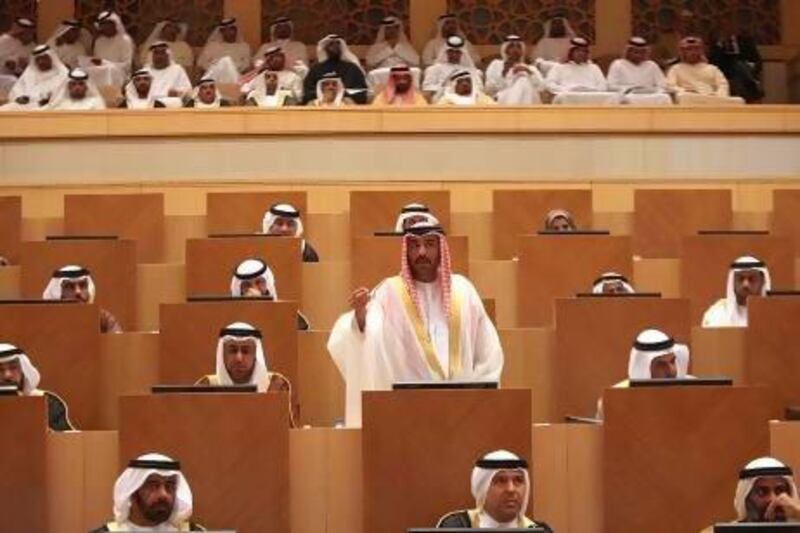ABU DHABI // Almost halfway through their second year, there are signs that some Federal National Council members are becoming frustrated.
Some attribute the dip in morale to the slow pace of work - and others to members' unrealistic expectations.
Since it convened in October, the FNC has met six times in the capital. But in those sessions, some say it has accomplished less than in the same period last year. Some members claim work has been hindered by the repeated absence of ministers called for questioning.
"I see in this term we are very weak," said Ahmed Al Shamsi (Ajman). In its first year, the council posed 24 questions to ministers in its first six sessions. This year, 21 questions were asked. "We hoped for more participation from ministers to come to discuss the questions," said Mr Al Shamsi.
He believes the council would get more done if it met more often, which would need to be approved by the Government. "The questions are there, in tens, but there are no sessions. This is something that interferes with the role of the FNC. If this continues, then we will have nothing to show for our nine months of work."
Hamad Al Rahoomi (Dubai) shared his frustration. "They are not there," he said. "There are many questions, but ministers are not attending." He has about eight questions awaiting ministers' attendance.
However, Umm Al Quwain's Ali Jassim, the longest-serving member of the FNC, said any sluggishness was the fault of the council members themselves. He said some members are less productive than their predecessors, producing weak reports and asking petty and repetitive questions.
The result, he said, was declining morale. That could be rectified by having the council's work evaluated every three months. "There is no way to measure how we are working," he said. "There is initial enthusiasm, then in the second year this goes down, and the third year is depression."
He warned new members of this pattern before they took their seats in 2011. "I told them you will have soft laws to pass, these take time, so have programmes that concern Emiratis to follow. Having two set goals and achieving them in the council is better than passing 50 proposals to the cabinet."
Members should also be proposing laws, as previous councils had done. "They have the right to suggest a certain legislation or amend one, but they do not practise this right," he said.
The previous council, he said, was the first to propose a child protection law. "Wadeema's law was actually the suggestion of the FNC," he said. "Hamad Harib Al Midfah, I still remember it, asked for a law to protect children. This was a recommendation from the council."
But the current FNC members are largely unaware of what they can do if they put their minds to it, he said. "To them everything is new, so even if the minister says something they said five years ago, they will not know they are saying the same thing," he said.






